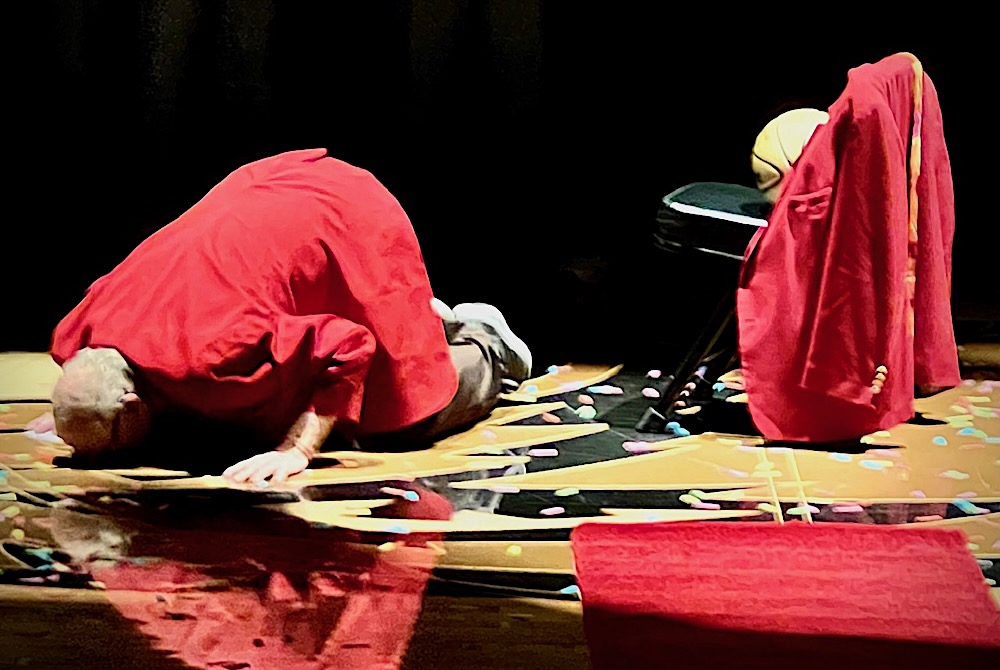
Johnston Retires as Winningest Coach, Much More to Beaverton Dream He Built
By
Paul Costanzo
Special for MHSAA.com
March 15, 2024
Before Roy Johnston left the court that bears his name for the final time as Beaverton head boys basketball coach on Feb. 23, 1,500-plus fans, family and current and former players had one more chant.
 It wasn’t the name of the coach they all adored after he wrapped up the winningest career in MHSAA basketball history. It wasn’t even the school song, or a slogan.
It wasn’t the name of the coach they all adored after he wrapped up the winningest career in MHSAA basketball history. It wasn’t even the school song, or a slogan.
With Johnston pumping a raised fist, the community chanted “Judy” to honor his wife, who could not be at the game or celebration as she was battling cancer.
It was a fitting tribute to the woman behind the coach who became more than the face of the community, and one last opportunity for those fans to say thank you to her for her own efforts and sacrifices in helping the Beaverton become something pulled straight from the movie screen – the small-town sports tale complete with the iconic coach in the lead role and generations of locals living their dedication by filling the stands for every game.
Judy Johnston passed away this past Saturday, a little more than two weeks after the ceremony that honored her husband. She was 81.
All interviews for this story were completed prior to her passing, but a common theme when talking about Johnston’s 50-year career and importance to Beaverton was that the entire family, specifically Judy, had played a big role.
“His family has put forth an incredible amount of effort into our community,” said former player Brent Mishler. “In basketball and in general.”
Family is at the center of Johnston and Beaverton’s immense success over his 50 years. Not only has he coached multiple generations of several Beaverton families – including three generations of Mishlers – but he’s coached his own children, and grandchildren.
Small town programs often rely on players who have grown up around them and together, and Beaverton has that in spades.
“It was a dream,” former player and Johnston’s co-coach, Shad Woodruff, said of having his son Layk play for Johnston. “I got to play for Roy and be part of all that Beaverton basketball is – it’s not just a sport around here. We have video of (Layk) dribbling a basketball in the gym literally before he could walk. He’s been the little guy that always looked up to (Roy’s grandsons) Spencer Johnston and Carter Johnston, so just to be a part of Beaverton basketball is special.
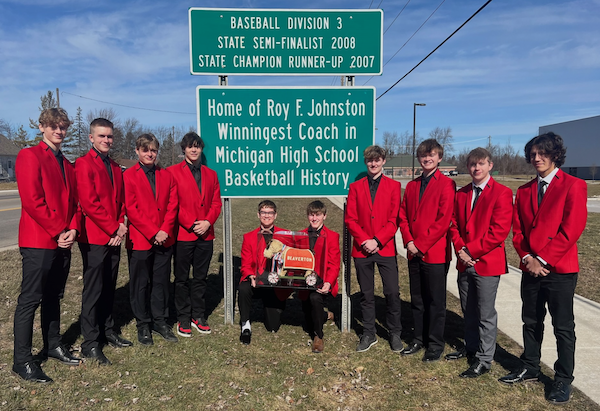 “It’s like when your kid gets there, you’re giving your kid to the community for a while and saying, ‘Here you go.’ It’s amazing to watch your son out there, especially in a community like ours. Roy has created this thing with Beaverton basketball where every Friday night, it’s like church. Everybody’s there.”
“It’s like when your kid gets there, you’re giving your kid to the community for a while and saying, ‘Here you go.’ It’s amazing to watch your son out there, especially in a community like ours. Roy has created this thing with Beaverton basketball where every Friday night, it’s like church. Everybody’s there.”
The numbers behind Johnston’s career, which started in 1966 in Yale, are remarkable. He holds the MHSAA record for wins by a boys basketball coach at 833, the vast majority coming at Beaverton, the program he took over in 1974.
The Beavers won 21 conference titles, 17 District titles and five Regional titles during Johnston’s 50 years, adding a run to the MHSAA Semifinals in 1984.
Just six of Johnston’s seasons ended in records below .500, and in a fitting tribute to their coach, this year’s Beavers scratched and clawed their way to a five-game win streak at the end of the season to ensure his last wouldn’t be No. 7, finishing the year 12-12 with a loss to Beal City in the District Final.
Included in that streak was a 54-45 victory over rival Gladwin on the night Johnston was honored. The Beavers trailed by as many as nine during the second half before rallying to win, led by a 26-rebound performance from 6-foot, 1½-inch senior Reese Longstreth, who Woodruff called the epitome of a Beaverton basketball player.
“I’ve been fortunate to be around Roy for 40 years, and I’ve seen a lot of great wins, especially in that gym,” Woodruff said. “I can’t put anything above that one.”
Layk Woodruff made the final basket in the game, which will forever be the final basket made in Roy F. Johnston Gymnasium during the Johnston era.
“It was super emotional, I’d say, for a bunch of reasons,” Layk Woodruff said of the game. “We felt like it was our responsibility, we had to that game for Roy. It was a rivalry game, last home game of the year – there were a lot of emotions when that game ended. I didn’t even think about (hitting the final shot) until a couple days later. Now that I get to think about it, it’s pretty cool to say that was me. I’ll always remember that.”
One celebration led to another, as Johnston’s retirement ceremony followed the game. A tribute video created by Beaverton graduate Jason Brown, who owns a digital media company, and narrated by longtime Beaverton public address announcer Scott Govitz was played. Govitz admitted to getting choked up at times while recording the video.
“There were a couple times where I did more than one take,” he said.
Govitz was at the center of a massive effort to create the ceremony, with support from athletic director Will Gaudard, school staff and members of the community, including multiple businesses and organizations. Govitz had arranged for special lighting and video screens for the presentation. Special tickets were printed for the night – which also happened to be Beaverton’s Hall of Fame night. Following the video, a spotlight was shone on center court, where a single chair sat, one of Johnston’s vintage red blazers draped over its back.
The more than 100 former players who had come to celebrate their coach each had a glow stick they cracked on, and walked through the darkness to surround the chair.
Then Johnston walked the red carpet – much like his starters have for years when being introduced prior to games – and addressed the crowd.
He didn’t speak for long, but as Johnston so often does, he hit all the right notes, mixing gratitude with humor.
“Gladwin County is a great place to raise a good family,” Johnston said after thanking the traveling contingent from Gladwin.
“I want to thank everyone for a great run. Fifty years. A great run.”
For outsiders, it was a chance to see the softer side of Johnston rather than the man intensely patrolling the sidelines during games. It was a glimpse at the man that handed out suckers before games to every kid in attendance.
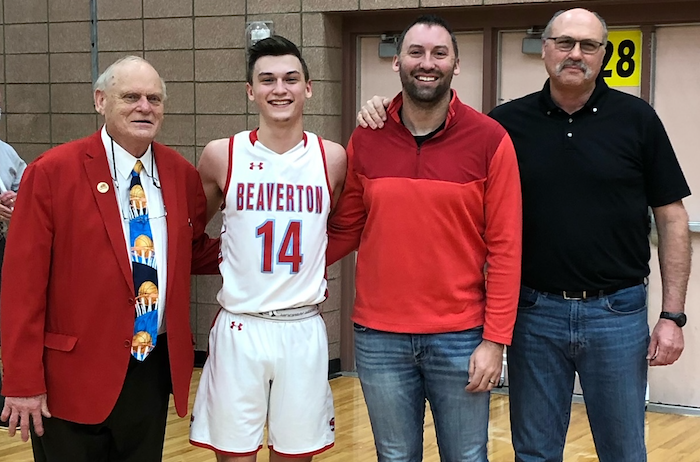 “He belonged on an episode of ‘Grumpy Old Men,’ and he still could play the role,” Govitz said with a laugh. “He would always say, ‘Don’t listen to the way I say it, listen to what I say.’ He just wants you to do things correctly. His players, maybe they didn’t adore it at the time, but they adore it now. Being a part of that program taught them more than basketball skills. … What will happen, once they leave, they find that great respect for it. And, he does things quietly that no one ever knows or sees – helping someone in need, especially the ones in college, checking up on them or sending them some money. That helps build a program and build relationships. He said in his last speech that it’s about getting along with others. If you can’t get along well with others, you can’t get along. That’s what it’s about.”
“He belonged on an episode of ‘Grumpy Old Men,’ and he still could play the role,” Govitz said with a laugh. “He would always say, ‘Don’t listen to the way I say it, listen to what I say.’ He just wants you to do things correctly. His players, maybe they didn’t adore it at the time, but they adore it now. Being a part of that program taught them more than basketball skills. … What will happen, once they leave, they find that great respect for it. And, he does things quietly that no one ever knows or sees – helping someone in need, especially the ones in college, checking up on them or sending them some money. That helps build a program and build relationships. He said in his last speech that it’s about getting along with others. If you can’t get along well with others, you can’t get along. That’s what it’s about.”
Mishler echoed that sentiment, and some of the memories that stick out most to the 2002 graduate were when Johnston got after him in his own special way.
“Playing for him was a privilege,” said Mishler, whose father Steve played for Johnston in the ’70s, and his son Cameron played through 2021. “The life lessons he taught set you up for success in life for the future. ‘You need to hear what I’m saying, not the method I’m saying it.’ That’s so true. Being honest and having expectations, and expecting people to hit those expectations, is not a bad thing.”
After Johnston was done speaking, he knelt down and kissed the floor to say goodbye to the job he’s done for most of his life, and in a way, thank you, to the community he helped create and that he’ll now need more than ever.
“Roy’s good at making you feel like he’s not big on that stuff (being recognized), and he isn’t, but he definitely does appreciate it,” Shad Woodruff said. “He understands how important he is to the community, and that he’s done something really special. He understands what he’s done is a pretty big feat, but he doesn’t talk about it. He doesn’t brag about it.”
 Paul Costanzo served as a sportswriter at The Port Huron Times Herald from 2006-15, including three years as lead sportswriter, and prior to that as sports editor at the Hillsdale Daily News from 2005-06. He can be reached at [email protected] with story ideas for Genesee, Lapeer, St. Clair, Sanilac, Huron, Tuscola, Saginaw, Bay, Arenac, Midland and Gladwin counties.
Paul Costanzo served as a sportswriter at The Port Huron Times Herald from 2006-15, including three years as lead sportswriter, and prior to that as sports editor at the Hillsdale Daily News from 2005-06. He can be reached at [email protected] with story ideas for Genesee, Lapeer, St. Clair, Sanilac, Huron, Tuscola, Saginaw, Bay, Arenac, Midland and Gladwin counties.
PHOTOS (Top) Beaverton boys basketball coach Roy Johnston kisses the court that bears his name during a celebration of his retirement Feb. 23. (Middle) This season’s team stands at the entrance to town with signs announcing the program and coach’s successes. (Below) Johnston takes a photo with three generations of Mishlers – Cameron, Brent and Steve. (Top photo by Stephanie Johnston.)
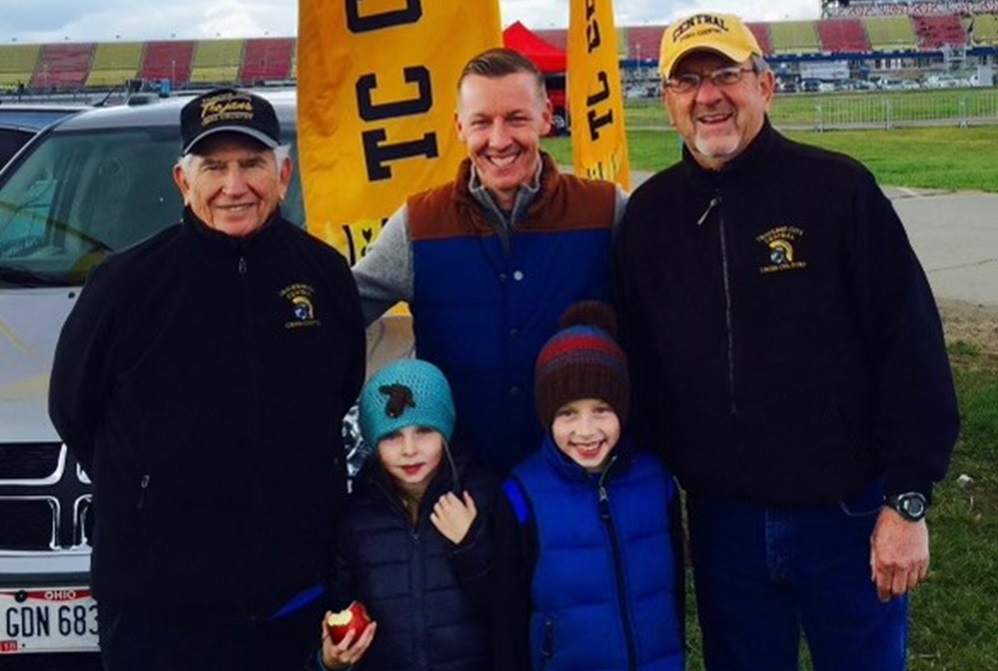
Longtime Coach Lukens Remembered for Building Champions, Changing Lives
By
Tom Spencer
Special for MHSAA.com
September 27, 2024
The results speak for themselves as there were conference, Regional and MHSAA Finals championship and runner-up finishes.
 But those accomplishments are not necessarily why Don Lukens will be remembered by most. It will be for the lives he touched and successes his student-athletes found after graduation.
But those accomplishments are not necessarily why Don Lukens will be remembered by most. It will be for the lives he touched and successes his student-athletes found after graduation.
Lukens impacted two communities separated by 200 miles during multi-decade coaching tenures for multiple high school programs.
Lukens died Sept. 15 at age 90. He was well-known across the state for his coaching as he spent 27 years teaching at Kalamazoo Loy Norrix, where he coached with Ted Duckett, and 33 years coaching at Traverse City Central with John Lober. Duckett, now 78, and Lober, 82, are still coaching today.
Tico Duckett, one of the most accomplished running backs in Michigan State University football history, is one of thousands of kids Lukens recruited into the running world. Duckett, who went on to play in the National Football League, credits Lukens for recruiting first-time track athletes from challenging life situations and turning them into college scholarship recipients.
Lukens knew how to get the best individual performances out his athletes, recalled Duckett, whose high school running career ended with a hamstring injury sustained during Regional preliminary sprints.
“I can tell story after story of kids that he plucked out of class, and they are successful today,” said the first MSU back to rush three times for more than 1,000 yards. “Between him and my dad, they would take kids that had no direction, no future, no hope and bring them in and teach them track and teach kids what you put into it is what you’re going to get out.”
Lukens had graduated from Western Michigan University where he’d participated in football and track. During his 38 years coaching track, Lukens’ teams posted a dual meet record of 220-24, won 20 conference championships, nine MHSAA Regional championships, a Lower Peninsula Class A title and finished runners-up twice.
Lukens’ cross country teams also were impressive with a record of 198-60 during his 34 years of coaching. They won 14 conference championships and 12 MHSAA Regional titles.
Tico Duckett has memories of being recruited to the sport as a child while his father served as an assistant coach at Loy Norrix.
“Coach Lukens would say, ‘I can’t wait ’til you get here,’” the former MSU star fondly recollected. “Coach Lukens loved track – he breathed and ate track.”
Loy Norrix hosts the highly-competitive Don Lukens Relays every May. Duckett attended this year’s meet as he often does. It was Lukens’ ability to recruit and coach track that made the Knights stand out across the state.
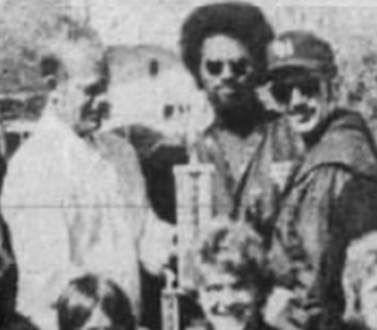 “Loy Norrix track was special,” said Duckett, proudly noting the Knights’ dual-meet dominance. “When we would go places and get off the bus, people would literally say, ‘There’s Loy Norrix,’ and they would literally talk about us, and we would show ’em on the track and we backed it up.”
“Loy Norrix track was special,” said Duckett, proudly noting the Knights’ dual-meet dominance. “When we would go places and get off the bus, people would literally say, ‘There’s Loy Norrix,’ and they would literally talk about us, and we would show ’em on the track and we backed it up.”
Inside the halls and walls of Loy Norrix, the Duckett name is engraved on trophies and next to track & field records earned by Tico Duckett and his brother TJ, who also went on to play professional football. Ted Duckett took over the head coaching duties when Lukens retired and moved to Platte Lake in Benzie County.
Word traveled fast that Lukens had arrived in Northern Michigan, and he immediately was asked to help Benzie Central by another legendary coach, Pete Moss, who died in 2019.
Lober ran across Lukens at a meet at Benzie and recruited him to coach distance running at Traverse City Central – which at the time had just five athletes committed to participate in those races.
Central had a prior history of success in sprints and field events, but the Trojans won the 1992 Class A title as their distance runners had become competitive enough to start contributing points at the Finals.
“We started coaching together in 1989, and we had 30-plus glorious years together,” Lober said. “We ended up qualifying right off the bat for the state finals, and we went 16 years in a row.”
Lober too was known for his recruiting to the sport.
“When we talked with kids, I’d be talking in one side of the kid’s ear and Don would be talking in the other,” Lober said with a laugh. “By the time we were done, the kid didn’t have a prayer of not joining the team.”
Lukens continued at Central until 2021, stepping aside as he ended 62 years of coaching.
Cody Inglis, now a senior assistant director for the MHSAA, served as Central’s athletic director while Lukens coached. He was well aware of Lukens’s coaching at Loy Norrix as he grew up a distance runner for nearby Portage Northern.
Inglis noted most of Northern Michigan knew very little of Lukens’ resume prior to his coming north. Inglis was coaching and serving as athletic director at the time for Suttons Bay when Lukens first joined the Trojans.
“People in Traverse City didn’t understand the success he had at Loy Norrix,” Inglis said. “I remember thinking, ‘Oh my gosh, Traverse City Central was good, and they’ll be even better’ and it’s no secret that the reason their cross country program took off was because of Don Lukens.”
Lukens won the inaugural Coaching Legacy Award at the 2019 Traverse City Record-Eagle/John Lober Honor Roll Meet. Going forward, the award will be named after Lukens.
Lukens is survived by his wife Rosinda, daughters Paige Gray of Gladwin, Wendy Pohl of Kalamazoo and Donyelle Hayhoe of Lansing, and five grandchildren: Brynn Rusch, Ian Gray, Westyn Hayhoe, Travis Hayhoe and Lucas Hayhoe.
The Trojans will host a memorial tribute to Lukens the day after next year’s Bayshore Marathon in Traverse City. A graveside service was held for Lukens on Monday at the Benzonia Township Cemetery.
 Tom Spencer is a longtime MHSAA-registered basketball and soccer official, and former softball and baseball official, and he also has coached in the northern Lower Peninsula area. He previously has written for the Saginaw News, Bay County Sports Page and Midland Daily News. He can be reached at [email protected] with story ideas for Manistee, Wexford, Missaukee, Roscommon, Ogemaw, Iosco, Alcona, Oscoda, Crawford, Kalkaska, Grand Traverse, Benzie, Leelanau, Antrim, Otsego, Montmorency, Alpena, Presque Isle, Cheboygan, Charlevoix and Emmet counties.
Tom Spencer is a longtime MHSAA-registered basketball and soccer official, and former softball and baseball official, and he also has coached in the northern Lower Peninsula area. He previously has written for the Saginaw News, Bay County Sports Page and Midland Daily News. He can be reached at [email protected] with story ideas for Manistee, Wexford, Missaukee, Roscommon, Ogemaw, Iosco, Alcona, Oscoda, Crawford, Kalkaska, Grand Traverse, Benzie, Leelanau, Antrim, Otsego, Montmorency, Alpena, Presque Isle, Cheboygan, Charlevoix and Emmet counties.
PHOTOS (Top) Longtime coach Don Lukens, far left, is pictured during the 2015 LP Cross Country Finals with past Traverse City Central runner John Steen (center) and Trojans coach John Lober, with Jane and Jack Steen standings in front. Jane and Jack Steen are current Traverse City Central runners. (Middle) The Niles Daily Star published this 1976 photo of Lukens (back row, second from right) and coach Ted Duckett (back row, center) receiving the championship trophy at the Daily Star Relays from publisher Bill Applebee. (Top photo courtesy of John Lober.)

